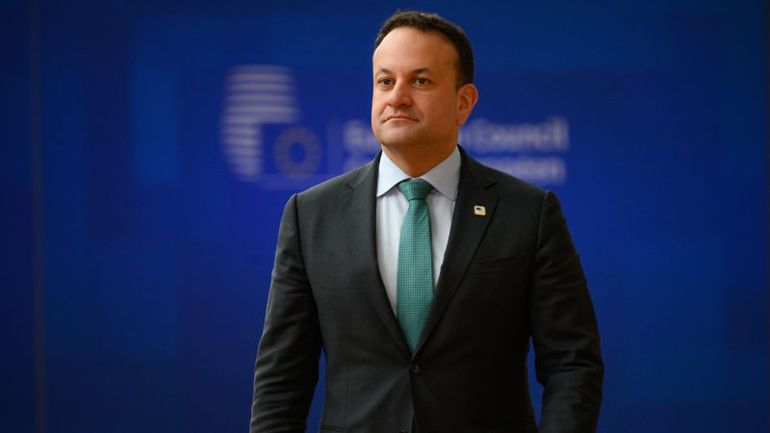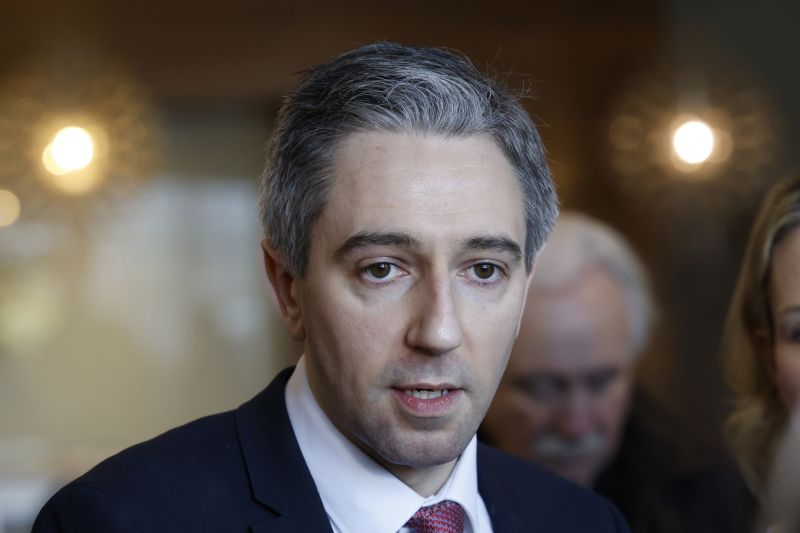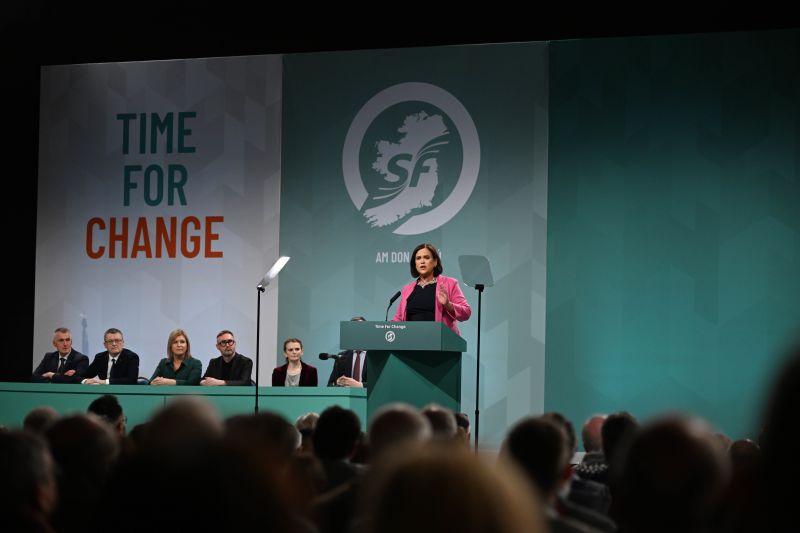
Irish PM's Unexpected Resignation: Unveiling the Reasons Behind the Decision

The sudden resignation of Prime Minister Leo Varadkar has left Ireland in disbelief as he openly admitted that he was no longer suited to lead the nation, sparking speculation and intrigue across the country.
Prime Minister Leo Varadkar surprised many in Ireland last week when he openly stated that he felt he was no longer the most suitable person to lead the country. This announcement sent shockwaves through the nation.
His decision to step down caught journalists, opposition lawmakers, and even members of his own government off guard. Varadkar cited personal reasons, but emphasized that his choice was mainly influenced by political considerations.
The 45-year-old had become a well-known figure internationally after making headlines in 2017 as the youngest prime minister in Irish history at the age of 38. He was not only Ireland's first gay leader but also the first of mixed race, symbolizing a new era of liberalism in the country. Through a series of successful referendums, he played a key role in bringing about progressive social change.
In December 2022, he once again assumed the position of taoiseach as part of a job rotation arrangement within the coalition government that was formed following the 2020 general election.
In recent weeks, Varadkar received praise for standing in solidarity with the people of Gaza. During a visit to the US last week, he challenged President Joe Biden on the sustained US support for Israel.
Irish Times political correspondent Jennifer Bray was caught off guard with less than an hour’s notice about the surprise statement from the taoiseach on Wednesday. Bray mentioned to CNN that the resignation was unexpected for everyone.
Professor Gary Murphy from Dublin City University mentioned that the speech had a sense of humility, which was unexpected from a politician like the taoiseach who is usually seen as aloof and out of touch with the public.
He also pointed out that it was very rare for a taoiseach to resign without any pressure from their own party, making it an unprecedented event in Irish political history.
Varadkar appeared to still be processing his decision on Thursday afternoon at the EU leaders summit in Brussels. He reassured reporters that his resignation was not triggered by any scandal or specific event. Despite this, doubts remain about the timing of his departure, just before the upcoming local and European elections. The next leader of Fine Gael, likely to be Higher Education Minister Simon Harris, will face a challenging task leading the party against a strong opposition.
Leo Varadkar is often referred to as a "man in a hurry" by commentators. He quickly climbed the political ladder and became the country's leader in less than 10 years. Despite starting out as a doctor, Varadkar gained valuable experience in prominent roles such as health minister and transport minister.
After becoming taoiseach in 2017, he presented himself as a leader for those "who rise early," pledging to bring economic prosperity and stability to Ireland after a severe financial crisis.
Despite criticism from opposition members and commentators labeling him a supporter of neo-liberalism similar to Thatcher, Varadkar maintains that he did not govern in that manner.
Murphy pointed out that even before the Covid-19 pandemic, the administration was not hesitant to spend public money, but they did not receive political recognition for it.
According to Murphy, Varadkar's consistent leadership during the pandemic should not be underestimated. The Irish government opted for a more careful approach to implementing lockdown measures, which, despite being unpopular at times, ultimately led to much lower case numbers and death rates compared to the United Kingdom.
Bray also acknowledged Varadkar's success in resolving the deadlock surrounding a no-deal Brexit in 2019. However, he noted that Varadkar's focus on Brexit did not sit well with the Irish public, who were more concerned about the worsening housing and homelessness crisis.
Varadkar's handling of the housing crisis is likely to be the defining issue of his legacy. Throughout his time as taoiseach, his government's failure to meet affordable housing targets has left many young voters unable to buy homes.
During his time in office, Ireland was able to change some of the traditional societal norms supported by the Catholic Church. This was accomplished through referendums that legalized same-sex marriage and lifted a ban on abortion. However, Varadkar's successful track record came to an end in March when a referendum to remove a constitutional reference about a woman's role in the home was rejected, resulting in a significant setback for him and his government.
Murphy suggested that the significant loss in the referendum may have influenced Varadkar's decision to step down, as he may have felt some responsibility for the outcome.
A social media savvy successor
Ireland's Minister for Further and Higher Education, Simon Harris, announced on Friday that he will run to become Fine Gael leader.
Ireland's Minister for Further and Higher Education, Simon Harris, announced on Friday that he will run to become Fine Gael leader.
Nick Bradshaw/PA/Alamy/Sipa
With several prominent politicians, such as finance minister and Eurogroup chairman Paschal Donohoe, choosing not to enter the race, the path is now clear for Simon Harris to potentially become the next taoiseach.
During his time as health minister amid the pandemic, the 37-year-old Harris gained recognition and is often seen as a similar figure to Varadkar, according to Murphy. However, Harris is known to be a more approachable and skilled communicator, having amassed a significant online following through his active presence on platforms like Instagram and TikTok.
Bray said that Simon Harris has pledged to bring enthusiasm and energy to his new role. Fine Gael is counting on him to bridge the gap with younger voters who have been feeling disconnected from the party.
Mary Lou McDonald, president of opposition party Sinn Fein, which has been making steady gains since 2020.
Mary Lou McDonald, president of opposition party Sinn Fein, which has been making steady gains since 2020.
Charles McQuillan/Getty Images
He will face a strong opposition from the Irish nationalist party Sinn Féin, led by Mary Lou McDonald, who have been gaining momentum since their impressive election victory in 2020. They have capitalized on the government's failure to address the housing crisis, promising voters that they have the solutions to end the problem.
The key question is whether Harris has the necessary political substance to match his polished image, according to Murphy. His biggest challenge will be to present new ideas that will resonate with voters before the next general election, scheduled to take place before March 2025.
Editor's P/S:
Leo Varadkar's unexpected resignation as Ireland's Prime Minister has sparked a wide range of reactions. While Varadkar's supporters have praised his leadership and the progress made under his tenure, critics have pointed to the housing crisis and other challenges facing the country. The timing of his departure, just before upcoming elections, has also raised questions about the reasons behind his decision.
Varadkar's legacy as Prime Minister will likely be debated for years to come. His supporters highlight his role in legalizing same-sex marriage and lifting the ban on abortion, as well as his handling of the COVID-19 pandemic. However, critics argue that his government failed to adequately address the housing crisis and that his policies exacerbated economic inequality. Ultimately, it is up to the Irish people to judge Varadkar's leadership and the impact he had on the country during his time in office. the results will shape the political landscape leading up to the next general election.










